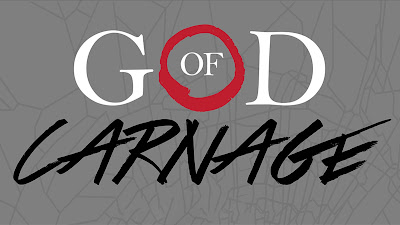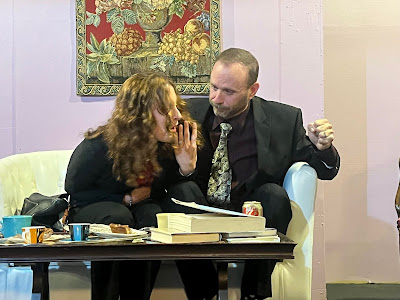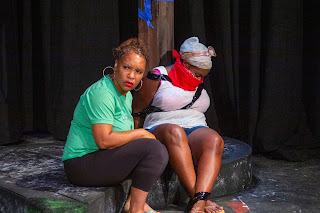By James V. Ruocco
Case in point: "God of Carnage," a serious affair where middle-class menace, bullying and serio-comic despair are captured magnificently by the playwright.
The stakes, of course, are high - awkward small talk, accusation, momentary violence, manifested drunkenness, verbal swordplay, forced bonhomie, antic mood swings, manipulation.
And, well, they should be.
Here, as in the playwright's other cynical, ferociously robust works - "Art," "Life x 3," The Unexpected Man," "The Passage of Winter" - everything hinges on the casting, the preparation, the creative process, the direction, the staging, the live performance and the defining shrewdness of how it all comes together.
On Broadway - March, 2009, to be exact - the exhilarating frisson of James Gandolfini, Marcia Gay Harden, Jeff Daniels and Hope Davis as two middle-class couples who meet one night to discuss and resolve a heated schoolyard fight between their two 11-year-old sons (one boy strikes the other with a stick that knocks out his two front teeth), prompted an animated, moment-to-moment verbal dance and tango of unforgettable madness, delirium and razor-sharp imagination that was not easily forgotten. Three years earlier, in London's West End, Ralph Fiennes, Tamsin Greig, Janet McTeer and Ken Stott, evoked the same perched savagery and argument illuminated in Reza's page-turning, aggressive playscript.
At the intimate, immersive Arts of Angeloria's where "God of Carnage" has settled in for an important, two-week run, the numbing effect of Reza's acerbic action and stinging verbiage is very much the same with Kevin Pelkey, Cristin Daley, Nicole Zolad and Jason Scot assuming the popular roles once played by the original Broadway and London cast. Every joke, every insult, every quirk, every swing, every tic and every rant is played full tilt by this incredibly talented non-Equity quartet, thus, making it bristle with a life force, an acidity and a primitive, biting aggression of all its own.
Intelligent.
Truth-Telling.
Capable.
Finely Shaded.
Game-Changing.
Definitive.
This revival not only has a wonderful sense of intuition about it, but it is potent and passionate and massive with very fierce, very predatory edges.
As theatre, it is liberal and angry. It is compassionate and nuanced. It is mouthy and perverse. It pulls no punches. It dissects society with stinging impact. It also retains the crackling precision, the fiery cynicism and the symbolic abundance commandeered by its creator. Elsewhere, a running gag of incessant cell phone interruptions mixed with characters continually switching sides, having anxiety attacks, spouting four-letter words, getting completely bladdered by booze or accidentally revealing their true colors in rapid fire succession, heightens the play's vitriolic energy.
"God of Carnage" is being staged by actor/director Joey Abate whose savvy, intuitive take on Reza's angry, mischievous character study simmers with harmonious analogy, skin-deep truism, observed construction, giggling sprite and fiery abandonment. As both director and storyteller, he accepts the playwright's rules of the game, her pragmatic undercurrents, her skillful hypocrisies, her blatant pronouncements and her dicey conflicts and crafts a meaty mind game of sorts that taunts and teases, spits and brays, fucks you over, toys with your senses and plunges you head-first into the play's well-timed jokes, arguments, confessions, outbursts and breaking points.
True to form, this revival unfolds with dialogue and conversations that demand the right pacing, the right rhythms, the right mindset, the right motivation and the right stimulation. One wrong move, one missed cue or one abrupt halt in the action and it's over. Just like that.
Abate, of course, never lets that happen. He experiments. He orchestrates. He digs deep. He takes chances. He surprises. He amuses. He entertains. He has great fun. He knocks you over. he plays mind games. But in the very best of ways. He not only knows the play inside out, backwards and forwards, but creates a stinging, verbal three-ring circus of sorts (shades of Edward Albee's "Who's Afraid of Virginia Woolf ?") that keeps coming at you from all directions with an emotive thrust and scrutinization that keeps to Reza's triggered conceit, its distinct criterion and its locked horns ante.
As penned by the playwright, "God of Carnage" is very rhythmic. It's all beats and measures. It's timed and played to the second. It's all very exact and specific. Even the overlapping voices of two or more characters talking at the same time requires the same split-second acumen. Not to worry, though. Abate's fiendishly clever manipulation of the script is real-time ready, playful, stylish and outrageousness. The fact that you never quite know what's around the corner or how things will actually play out heightens the play's appeal, its story arc evolution and its numbing conclusion.
Directorially, Abate also embeds the entire production with a Pinteresque tug-of-war, captured so intuitively under his tutelage via choice stage direction, movement and in-the-moment fluidity. Perfectly timed, chimed, executed and delivered, it's a demanding feat, but one Abate excels with flying colors.
In the role of Michael, an uncouth husband, father and self-made businessman very eager to create peace between the two conflicted schoolboys, Kevin Pelkey delivers a raw, polished and showstopping character portrait (he's absolutely amazing to watch throughout the entire 80-minute production) of a typically restless individual who tries too hard, makes racial slurs and denounces child-rearing as something completely wasteful. His comic timing is impeccable. His line delivery is flawless. He nails the emotional heart and soul of his character's persona perfectly. He can be truth or dare at once. He's completely in sync with Reya's interpretation of the role. And often, when just standing there listening and observing, we know exactly what he is thinking.
As Michael's judgmental, uptight, opinionated wife Veronica, a woman who is writing a book about the Darfur atrocities and hopes to maintain a peaceful resolve for her son's injury, Cristin Daley is a whirlwind of rational deliberation, personal bias, emotional pain and thin-lipped liberalism. She's not only right for the part, it's a role she owns and plays with complete honesty, drive, passion and amazing serio-comic flourish. Smartly attuned to Reza's linguistic oeuvre, she displays the right rhythms, tics and beats in an open arena where dangerous mind games and limited visions collide within the marvelously sketched limits of the playwright's controlled, wickedly funny blueprint. Like Pelkey, she too is amazing to watch as she shifts gears effortlessly without ever once missing a beat.
Jason Scot, cell phone in hand for the part of Alan (it's eventually tossed into a vase of fresh tulips), a slippery, chatty, self-centered, high-powered, corporate/libel lawyer representing a pharmaceutical company about to be sued over one of its new products that has harmful side effects, delivers a wildly inventive roller-coaster-ride of a performance that gets under your skin, slaps you in the face, pisses you off and makes you want to get up from your seat and punch him very hard in the stomach for being such a smarmy, first-class prick. As an actor, he pulls you right into Alan's convoluted story, his shaky marriage, his slimy business tactics and his pacy anxiety. Elsewhere, his remarkable ability to shift gears from story to cell phone (he cleverly milks and orchestrates the character's attachment to his mobile) within a millisecond, is brilliantly rendered as is his complete breakdown, a wonderfully balanced actor's moment that triggers convulsed laughter and cheers in all the right places.
As Alan's wife Annette, a woman on the verge of yet another panic attack who is constantly annoyed by her husband's feckless behavior and total ignorance, Nicole Zolad gives a standout, ovation worthy performance that is honest, electrifying and perfectly calibrated. As "God of Carnage," evolves, she is very clear and very focused about her character, her dialogue, her conversations, her moves, her behavior, her expressions and her interaction with the other on-stage actors. It's a part she plays brilliantly with a smartness, purpose, honestly and a broodingly intense desperation that is thrilling to watch and discover.
Another key element in Zolad's characterization is that fact that Alan's behavior literally makes her sick. Here, in a scene that is effective, but slightly toned down by Abate for shock value, Annette vomits all over Veronica's precious art books and everything else on her coffee table. On Broadway, in London and in the film adaptation "Carnage," it is staged in gory, graphic detail with lots and lots of puke spilling everywhere. Here, the rogue vomit is in short supply. Zolad's perfectly timed take on this clearly unsettling moment, nonetheless, still gets the point across in much the same way as Reza intended.
Tense, crafty, satirical, edgy and unpredictable, "God of Carnage" is an exhilarating piece of theatre written with great insightfulness and craft by Yasmina Reza. Under Joe Abate's smart, keen, unrelenting direction, the cast of four - Pelkey, Daly, Scot, Zolad - deliver confident and determined performances that crackle with such excitement, you forget that you are in a theater watching a play.
A bold, disturbing work of tremendous power and observed disintegration, this revival of "God of Carnage" is fresh, superb and exciting on all levels. It is chock full of wit, shrewd humor and a great amount of fun. It's numbing effect lingers long after the play has ended.

































